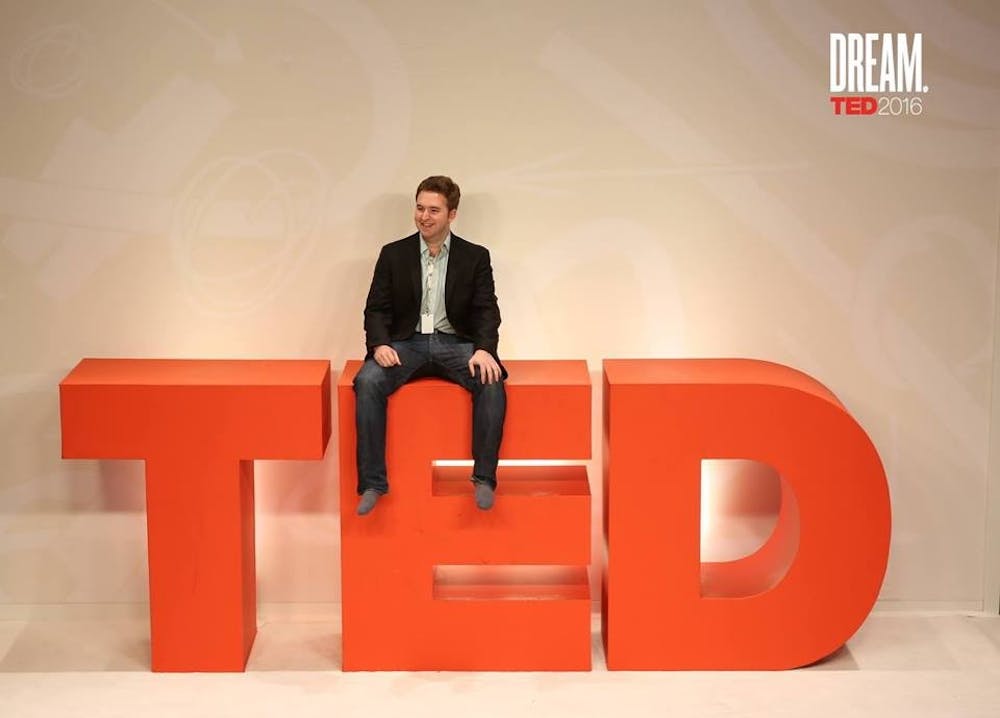When junior Jonny Deaton’s short film “Joining the Conversation” won the Nukebusters Short Film Contest, he thought his fame would end shortly after.
He did not anticipate presenting at a TED conference months later.
Deaton, a cinema and television arts major at Elon University, spoke at the TED2016 Conference Feb. 15 in Vancouver, British Columbia. His four-minute film depicted millennials and their lack of knowledge of nuclear weapons. The contest was hosted by a nonprofit organization called Physicians for Social Responsibility that advocates against nuclear warfare.
Deaton’s sister interned for the nonprofit last summer and encouraged Deaton to enter the contest.
Over the summer, Deaton was an intern at a production company called 7ate9. With the help of his sister back in Washington D.C., Will Lee ’15 and his internship, Deaton spent two and a half weeks over the summer creating his film.
“We edited the film for 36 hours, which is the longest editing I have ever done in my life,” Deaton said.
Deaton decided that the concept of the video would be to sit down millennials in front of a white screen and use “shock factor” to give the film authenticity. He was assistant editor and director, while Lee was the primary editor and director of photography.
“What we are used to is a narrative dramatized version of what nuclear weapons are. Plus, it has not been a problem in our generation,” Deaton said. “We didn’t live through World War II or the Cold War — it’s just not a very real thing to us.”
Deaton credits his production company internship as a huge help in producing the film. They helped him secure insurance for gear that he rented as well as studio space to shoot.
N Square, a multi-million dollar nuclear weapon policy initiative, funded the Nukebusters Contest. The organization had a space at TED2016 and invited Deaton to speak. His film kicked off their section of the conference.
“I understand that I am the one that went to speak at TED, but it was a massive group effort,” Deaton said.
Filmmakers spoke after Deaton, including Food Inc. producer and director Robert Kenner.
Other films included a full feature length documentary about nuclear weapons as well as a documentary on virtual reality.
Following Deaton’s speech, he spoke on a panel with other TED speakers and was essentially left in the Vancouver convention center with who he considers to be 1,300 of the world’s most important people.
He was unsure what to do — as a 22-year-old college student, it was intimidating for him to walk up to people who were changing the world around him.
The Vancouver convention center was split up into different rooms, with only about 50 or 60 people allowed in each. There were televisions livestreaming TED Talks occurring throughout the day, as well as themed rooms, such as a room with a ball pit.
Deaton went and sat in one of the rooms for about an hour.
“I was a little scared. I don’t have a problem being by myself, but it was just a very new situation,” he said. “I shut my laptop and decided to get up because this was the one opportunity for me to really network.”
Deaton networked and gave out half his business cards throughout the day.
“I met people that manage hedge funds, who are animal rights activists, doctors and scientists,” he said
Though Deaton did not meet any other students, there were other young TED speakers presenting, including 10-year-old Ishita Katyal, a keynote speaker who wrote novels about how females should be educated in third-world countries.
To prepare for his speech, Deaton consulted his father, who he said is “the most insane public speaker on Earth.” With experience debating on CNN, Deaton’s dad helped practice with his son via Skype.
But at the end of the day, it came down to Deaton relying on himself.
“TED is very different, and it’s not the kind of public speaking opportunity that you normally get,” he said.
Deaton considers himself lucky to have been able to speak at TED, but he emphasized how important his production team was to him.
“One of my favorite quotes is, ‘You are a direct product of who you surround yourself with,’” Deaton said. “I found people who were willing to sacrifice things at the drop of a hat.”
He said Lee helped storyboard and come up with different concepts, making time in his incredibly busy days to help produce the film.
“You need people you know you can work with, that you can rely on and be with you through thick and thin,” Deaton said. “They are not going to use you to climb up the ladder — you’re going to go up together.”


